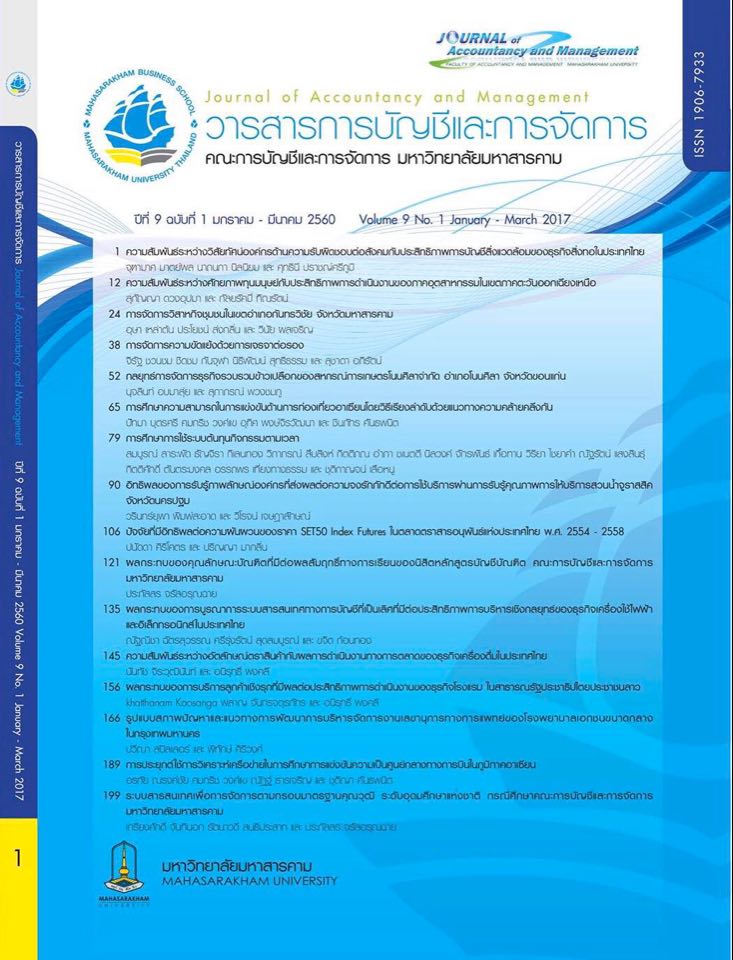ความสัมพันธ์ระหว่างวิสัยทัศน์องค์กรด้านความรับผิดชอบต่อสังคมกับประสิทธิภาพการบัญชีสิ่งแวดล้อมของธุรกิจสิ่งทอในประเทศไทย
Main Article Content
บทคัดย่อ
การวิจัยครั้งนี้มีวัตถุประสงค์ เพื่อทดสอบความสัมพันธ์ระหว่างวิสัยทัศน์องค์กรด้านความรับผิดชอบต่อสังคมกับประสิทธิภาพการบัญชีสิ่งแวดล้อมของธุรกิจสิ่งทอในประเทศไทย โดยใช้แบบสอบถาม เป็นเครื่องมือในการเก็บรวบรวมข้อมูลจากผู้บริหารฝ่ายบัญชีธุรกิจสิ่งทอในประเทศไทย จำนวน 105 คน สถิติที่ใช้ในการวิเคราะห์ข้อมูล ได้แก่ การวิเคราะห์สหสัมพันธ์แบบพหุคูณ
และการวิเคราะห์การถดถอยเชิงพหุคูณ ผลการวิจัย พบว่า วิสัยทัศน์องค์กรด้านความรับผิดชอบต่อสังคม ด้านธรรมาภิบาลขององค์กร ด้านการดำเนินงานอย่างเป็นธรรม ด้านการพัฒนาสังคม และด้านการใส่ใจสิ่งแวดล้อม มีความสัมพันธ์และผลกระทบเชิงบวกกับประสิทธิภาพการบัญชีสิ่งแวดล้อมโดยรวม ผลลัพธ์ที่ได้จากการวิจัย สามารถนำไปเป็นแนวทางในการกำหนดวิสัยทัศน์องค์กร
ในด้านความรับผิดชอบต่อสังคม เพื่อปลูกจิตสำนึกให้กับบุคลากรในองค์กรและตอบสนองความต้องการของสังคมที่คาดหวังไว้
กับองค์กรในเรื่องของความรับผิดชอบต่อสังคม ซึ่งเป็นการสร้างความน่าเชื่อถือและภาพลักษณ์ที่ดีให้กับองค์กรผ่านรายงานการบัญชี
สิ่งแวดล้อมของธุรกิจที่นำเสนอต่อบุคคลที่เกี่ยวข้องทั้งภายในและภายนอกองค์กร
Downloads
Article Details
บทความที่ได้รับการตีพิมพ์เป็นลิขสิทธิ์ของวารสารการบัญชีและการจัดการ
ข้อความที่ปรากฏในบทความแต่ละเรื่องในวารสารวิชาการเล่มนี้เป็นความคิดเห็นส่วนตัวของผู้เขียนแต่ละท่านไม่เกี่ยวข้องกับมหาวิทยาลัยมหาสารคาม และคณาจารย์ท่านอื่นๆในมหาวิทยาลัยฯ แต่อย่างใด ความรับผิดชอบองค์ประกอบทั้งหมดของบทความแต่ละเรื่องเป็นของผู้เขียนแต่ละท่าน หากมีความผิดพลาดใดๆ ผู้เขียนแต่ละท่านจะรับผิดชอบบทความของตนเองแต่ผู้เดียว
เอกสารอ้างอิง
กัญญรัตน์ หงส์วรนันท์. (2555). การแสดงความรับผิดชอบต่อสังคม : กลยุทธ์และโอกาสขององค์กรธุรกิจ
ประเทศกำลังพัฒนาในสังคมพลวัต. นิเทศศาสตร์ธุรกิจบัณฑิตย์, 6(2) : 83-112
กรมโรงงานอุตสาหกรรม กระทรวงอุตสาหกรรม. (2557). รายชื่อโรงงานอุตสาหกรรม. ค้นเมื่อ 20 มีนาคม 2557,
จาก https://www.diw.go.th/hawk/default.php.
นิภา วิริยะพิพัฒน์. (2552). ก้าวทันกระแสความรับผิดชอบต่อสังคม. วารสารวิชาการมหาวิทยาลัยหอการค้าไทย.
, (3) : 197
นิพันธ์ เห็นโชคชัยชนะและศิลปพร ศรีจั่นเพชร. (2552). ทฤษฎีการบัญชี. กรุงเทพฯ : ทีพีเอ็น เพรส
บุญชุม ศรีสะอาด. (2553). การวิจัยเบื้องต้น. (พิมพ์ครั้งที่ 7). กรุงเทพฯ : สุวีริยาสาส์น.
พยอม กบิลพัฒน์. (2556). ผลกระทบของความรับผิดชอบทางสังคมเชิงกลยุทธ์และการเปิดเผยข้อมูล
ด้านสิ่งแวดล้อมที่มีต่อประสิทธิผลการบัญชีสิ่งแวดล้อมของธุรกิจที่ได้รับ ISO 14001 ในประเทศไทย. วิทยานิพนธ์มหาบัณฑิต. มหาวิทยาลัยมหาสารคาม.
ปิยะนารถ สิงห์ชู. (2557). คุณค่าหลักจริยธรรมทางธุรกิจต่อองค์กร. ค้นเมื่อ 15 มิถุนายน 2558,
จาก https://www.gotoknow.org/posts/533883
สานิตย์ หนูนิล. (2554). บทบาทหน่วยงานทรัพยากรมนุษย์ในงานด้านความรับผิดชอบต่อสังคมขององค์กร.
สหศาสตร์ศรีปทุม . 1,(2) : 4
สำนักงานส่งเสริมวิสาหกิจขนาดกลางและขนาดย่อม. (2556). ผู้ผลิต SME สิ่งทอและเครื่องนุ่งห่ม.
ค้นเมื่อ 27 กรกฎาคม 2557, จาก https://www.sme.go.th/Pages/home.aspx#page=page-act
มาริสา เชาว์พฤติพงศ์. (2555). การจัดองค์กรและการบริหารงานบุคคล. ค้นเมื่อ 3 ธันวาคม 2558,
จาก https://www.east.spu.ac.th.
รพีพรรณ วงศ์ประเสริฐ. (2553). ความรับผิดชอบต่อสังคมของธุรกิจ Corporate Social Responsibility – CSR.
กรุงเทพฯ : มหาวิทยาลัยกรุงเทพ.
ศรีรุ่งรัตน์ สุดสมบูรณ์.(2549). ความสัมพันธ์และผลกระทบของศักยภาพภายในองค์กรและสภาพแวดล้อมทางธุรกิจที่มี
ต่อประสิทธิผลของการบัญชีสิ่งแวดล้อมของธุรกิจที่ได้รับ ISO 14001 ในประเทศไทย. วารสารมนุษยศาสตร์
และสังคมศาสตร์ มหาวิทยาลัยมหาสารคาม. ฉบับพิเศษ : 460-467
อิสรีย์ โชว์วิวัฒนา. (2553). บทบาทนักบัญชี : การเปิดเผยข้อมูลเกี่ยวกับสิ่งแวดล้อม. กรมบัญชีกลาง.
Aaker, D. A., Kumar, V., & Day, G. S. (2001). Marketing research (7th ed.). New York : John Wiley & Sons.
Black, K. (2006). Business statistics for contemporary decision making (4th ed.). USA : John Wiley & Sons.
Cronbach, L. J. (1970). Essentials of psychological testing (3rd ed.). New York : Harper & Row.
Rovinelli, R. J., & Hambleton, R. K. (1977). On the use of content specialists in the assessment
of criterion - referenced test item validity. Journal of Educational Research, 49-60.
Sarmento, D. D. & Manucle D, (2005) “Study of Environmental Sustainability : The Case of Portuguese
Pollution Industries, Energy, An International Journal. 30(8) : 1247 : 1257


